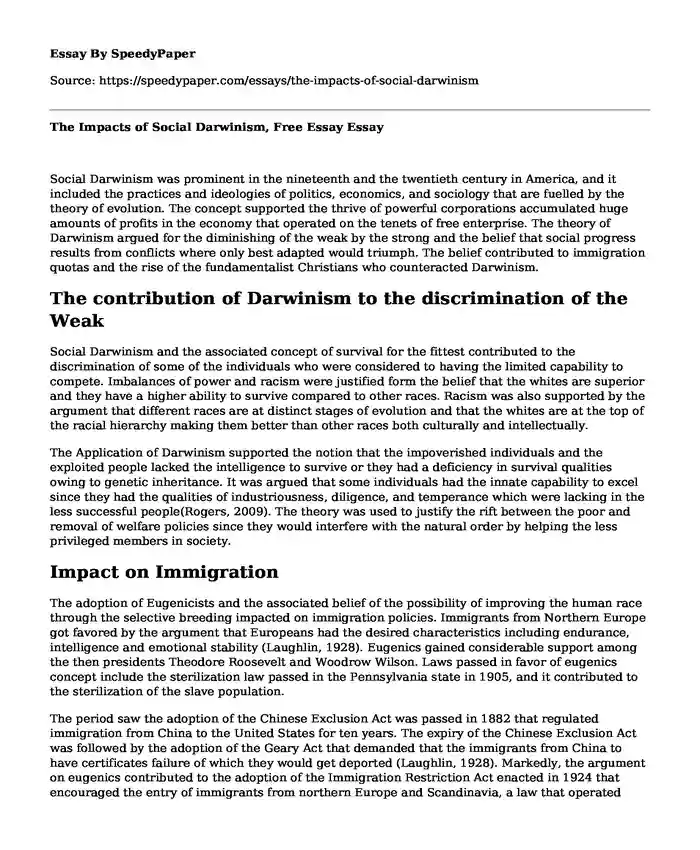Social Darwinism was prominent in the nineteenth and the twentieth century in America, and it included the practices and ideologies of politics, economics, and sociology that are fuelled by the theory of evolution. The concept supported the thrive of powerful corporations accumulated huge amounts of profits in the economy that operated on the tenets of free enterprise. The theory of Darwinism argued for the diminishing of the weak by the strong and the belief that social progress results from conflicts where only best adapted would triumph. The belief contributed to immigration quotas and the rise of the fundamentalist Christians who counteracted Darwinism.
The contribution of Darwinism to the discrimination of the Weak
Social Darwinism and the associated concept of survival for the fittest contributed to the discrimination of some of the individuals who were considered to having the limited capability to compete. Imbalances of power and racism were justified form the belief that the whites are superior and they have a higher ability to survive compared to other races. Racism was also supported by the argument that different races are at distinct stages of evolution and that the whites are at the top of the racial hierarchy making them better than other races both culturally and intellectually.
The Application of Darwinism supported the notion that the impoverished individuals and the exploited people lacked the intelligence to survive or they had a deficiency in survival qualities owing to genetic inheritance. It was argued that some individuals had the innate capability to excel since they had the qualities of industriousness, diligence, and temperance which were lacking in the less successful people(Rogers, 2009). The theory was used to justify the rift between the poor and removal of welfare policies since they would interfere with the natural order by helping the less privileged members in society.
Impact on Immigration
The adoption of Eugenicists and the associated belief of the possibility of improving the human race through the selective breeding impacted on immigration policies. Immigrants from Northern Europe got favored by the argument that Europeans had the desired characteristics including endurance, intelligence and emotional stability (Laughlin, 1928). Eugenics gained considerable support among the then presidents Theodore Roosevelt and Woodrow Wilson. Laws passed in favor of eugenics concept include the sterilization law passed in the Pennsylvania state in 1905, and it contributed to the sterilization of the slave population.
The period saw the adoption of the Chinese Exclusion Act was passed in 1882 that regulated immigration from China to the United States for ten years. The expiry of the Chinese Exclusion Act was followed by the adoption of the Geary Act that demanded that the immigrants from China to have certificates failure of which they would get deported (Laughlin, 1928). Markedly, the argument on eugenics contributed to the adoption of the Immigration Restriction Act enacted in 1924 that encouraged the entry of immigrants from northern Europe and Scandinavia, a law that operated until the adoption of Immigration and the Nationality Act of 1965.
Arguments Against Darwinism
The fundamentalist Christians argued against Darwinism since they held that implementation of the concept would lead to degradation of morals in society. The Christians argued for the outlaw of the Darwinian theory in the public schools' syllabus. They did not want children to be taught about human being evolution from lower animals (Social Darwinism, 2000). The earliest states to heed to the Christians arguments on outlawing the teaching of evolution in public schools were Mississippi and Arkansas with the adoption of antievolution laws.
The Fundamentalist Christians supported the abolitionist movement of the 1850s and 1860s and by arguing against Darwinism concept that justified the institution of slavery. The Christians argued against the Darwinism view, they popularised the Christian principles and argued for the creation viewpoint in explaining the origin of man (Social Darwinism, 2000). Importantly the staunch Christians argued for equality of all races and condemned the differential treatment towards any individuals whether they were from their race or not.
Overall, many opportunistic economists and politicians adopted the Darwin theory of evolution to achieve their selfish ends. The Darwin theory destroyed humanity and the feeling of empathy towards the less privileged members of the society and the removal of government welfare programs in support of the free market economy. The immigrants were severely affected by eugenics since the concept did not support immigration from the countries that were considered to be lower in the stages of development.
References
Laughlin, H. H. (1928, February). The Eugenical Aspects of Deportation. In hearings before the Committee on Immigration and Naturalization House of Representatives, 70th Congress.
Rogers, K. (2009). Beyond Darwin: Eugenics, Social Darwinism, and the Social Theory of the Natural Selection of Humans
Social Darwinism. (2000). In A. J. Motyl (Ed.), Encyclopaedia of nationalism: leaders, movements, and concepts. Oxford, UK: Elsevier Science & Technology.
Cite this page
The Impacts of Social Darwinism, Free Essay. (2022, Jul 01). Retrieved from https://speedypaper.com/essays/the-impacts-of-social-darwinism
Request Removal
If you are the original author of this essay and no longer wish to have it published on the SpeedyPaper website, please click below to request its removal:
- College Application Essay Example
- Citation and Notification of Penalty - Workplace Safety Essay Sample
- Free Essay with a Research on Body Image of College Students
- Free Essay: Data Recovery from the Corrupted Computer
- Free Essay on Strategies to Improve the Social Skills of Children with ASD
- Essay Sample: Bereavement Therapy for Military Children
- Free Essay Claiming Sir Wilfrid Laurier Is the Best Prime Minister of All Times
Popular categories





